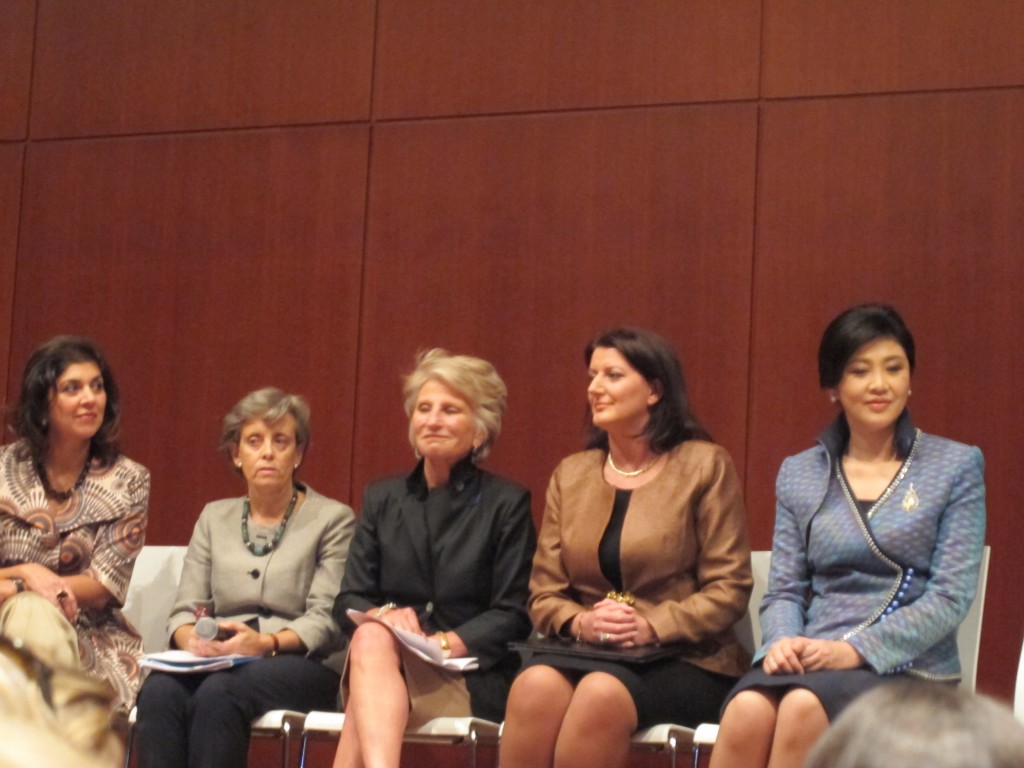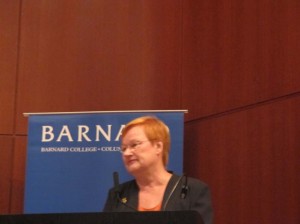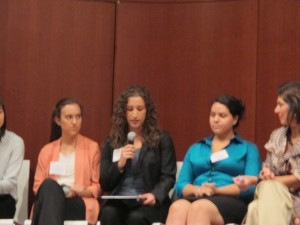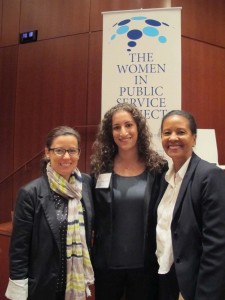
Three reigning and former women heads of state headlined a global women’s leadership forum held recently in Harlem at Barnard College. Prime Minister of Thailand, Yingluck Shinawatra; President Atifete Jahjaga of the Republic of Kosovo; and former President Tarja Halonen of Finland joined more than 300 students, faculty and guests at the Women in Public Service Project. The long-term goal of the project is to have 50% of the world’s political and civic leaders be women by 2050. All three women leaders were in town for the 67thUnited Nations General Assembly held September 24.

Deborah L. Spar, Barnard College president moderated the event where the mantra “50-50” was heard throughout the evening. The other powerful women in attendance were Melanne Verveer, Ambassador-at-Large for Global Women’s Issues, an Obama appointee; Jane Harman, former congresswoman and CEO/president of Woodrow Wilson Center; Marta Santos Pais, Special Representative, United Nations Secretary-General on Violence Against Children; Farah Anwar Pandith (Smith College), Special Representative to Muslim Communities; and Rangita De Silva De Alwis, Director of the Global Women’s Leadership Initiative at the Woodrow Wilson International Center for Scholars.
I was so proud to see so many of my Smithie sisters in attendance as guests and as program participants. Jane Harman, Smith College and Harvard Law School grad offered her ‘Jane’s lessons’: “Leadership is inside out. It’s hard work. Being a leader can be lonely because everyone will not like you. But, you can’t ever give up! When you succeed, no matter what field you choose, your most important obligation is to mentor women who will come after you. Always remember what Madeline Albright said: ’There’s a special place in hell reserved for women who don’t help other women’.”
The UN’s ‘rule of thumb’ was one of the principles mentioned. “They see it as inherently linked to democracy and also to human rights,” said Santos Pais. “This should give the General Assembly inspiration to overcome challenges regarding how women are treated in their countries.”
Secret Service men in dark suits and shaded glasses entered Barnard’s Diana Center’s Event Oval auditorium and flanked the stage and front row seats to pave the way for Thailand’s Prime Minister, Her Excellency Yingluck Shinawatra and Kosovo’s President Jahjaga.

Finland’s Halonen on the other hand, brought levity and humor to an otherwise serious program as one of the closing speakers. “We don’t have oil or gold in Finland. We have lots of ice and fish. So, while the men were off fishing, we women ran the country. When they got back home, we didn’t want to give up control. So, even in a socialist country, we had to work hard to achieve our goals.”
Do women govern differently from men? Yes, said most of the panelists. A synopsis of their responses: “We women are problem solvers. We build bridges. We know about compromising and most of us are happy to share the credit. Given that we all have a diverse set of perspectives and politics, we must learn to listen and make coalitions.”

Student participants were invited to discuss a range of topics including: Natalia Alvarez Diaz, Mount Holyoke, on violence against women; Ava Anderson, Mills College, on networking and mentoring in the public and private sectors; Dahna Black, Smith College, on reaching the “50 by 50” in public service and the way women’s caucuses can help; Claudia Garcia, Mount St. Mary’s College, on access to water post-conflict and its impact on women; Kristie Hernandez, South Los Angeles community organizer, on civil rights and civil liberties in US barrios; Olivia Low, Barnard College, on bringing ‘grassroots women’ to decision-making tables; Melda Salhab, Wellesley College and Lebanon native, on how family law, religious law creates inequalities for women; Yashaswini Singh, Bryn Mawr, on women’s participation in finance and economic decisions.
Overall message to women: “Serve one’s country; serve one’s community and don’t be so focused on “my career.”

Most memorable quote from global women’s forum: “It is more dangerous to be a woman or girl than it is to be a soldier in most of the world,” said Marta Santos Pais, UN Secretary-General on Violence Against Children, Special Representative.
The forum was sponsored by The Women in Public Service Project as developed by five leading women’s colleges: Barnard College, Bryn Mawr, Mount Holyoke, Smith College and Wellesley. www.womeninpublicservice.org
The other sponsors were the Wilson Center, www.wilsoncenter.org and Barnard, www.barnard.edu